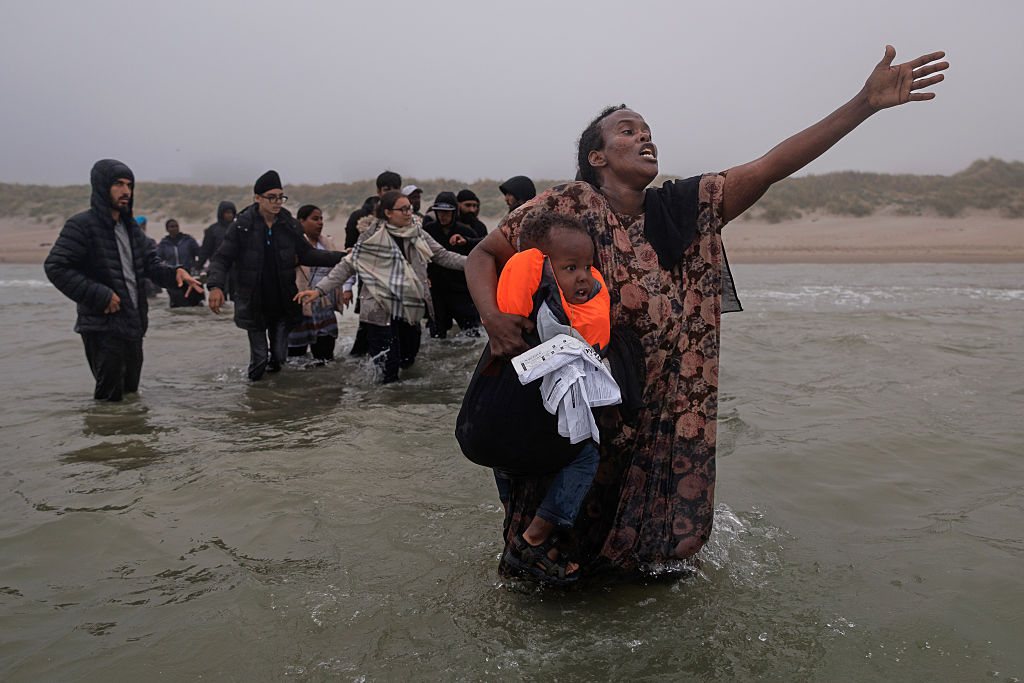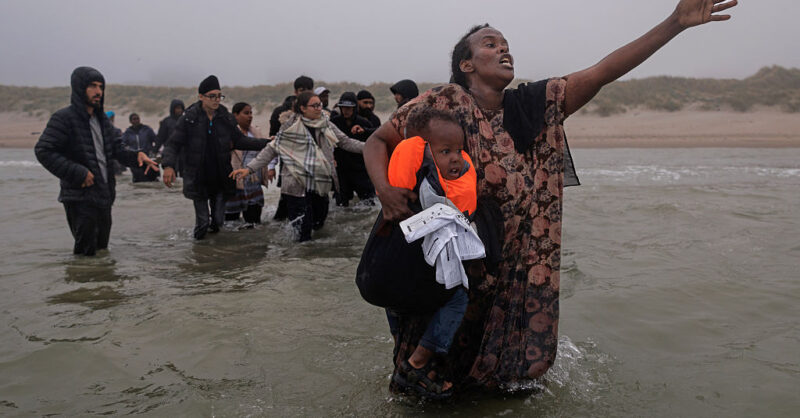
Photo by Dan Kitwood/Getty Images
Travelling around the country talking about the small boats crisis, you tend to hear the same questions come up. Several months in, I’ve learned what interests an audience. But at a recent event, a new question gave me pause for thought. I’m still mulling it over weeks later. I was asked: has the crisis been manufactured or is it the result of real governmental incompetence?
The asylum system has undoubtedly been ground down, with seeds of division sown for political gain. Years – decades – of performative politics, headline-grabbing and toxic rhetoric have whipped many up into a frenzy, resulting in further summer riots and the Epping hotel maelstrom. My former colleagues inside the Home Office are said to be “reeling”, unsure how to respond to Nigel Farage’s mass deportation proposals. His messages are simple, digestible and potent; the department can’t compete. Keir Starmer has instead chosen to remain silent, allowing Reform to seize the narrative and fan the flames.
There is no doubt that migration – particularly small boats migration – is the biggest political issue in the country. But it can also feel like just that: a political issue, spun up by rhetoric and algorithms. If we cannot tell whether the problem is manufactured or material, a panic or a crisis, the fault of Farage or of the politicians who have actually been in power for the last two decades, then it is time for a clearer, cleaner view. We should take a different approach, and look at this as a crisis not for politics but for people. Which lives, we should ask are really affected by the current chaos? Who are the real victims of the small boats issue?
What I hear most often from those on the frontline – the coastguard taking distress calls from those onboard the dinghies, the Border Force guards hauling bodies out of the Channel, the caseworkers conducting “life or death” asylum interviews – is that they resent their jobs having become so politicised. They are understaffed, overworked, under-resourced. And worse than that, they often bear the brunt of the vitriol from members of their local communities. Over the course of a few days, I shadowed a new member of the RNLI rescue crew in Dungeness. Within two weeks of taking up his role as a volunteer, his tyres had been slashed. One day we turned up at the lifeboat station to see “Taxi” spray-painted over the doors, parroting Farage’s claims the crews were a “taxi service for illegal migrants”. Another search and rescue worker had been beaten unconscious and hospitalised, recognised for TV interviews he had done on the issue. The teenage daughter of a coastguard was stopped in the street by three men who shouted and swore at her, accusing her father of people smuggling. Most frontline workers I speak to have been pilloried at the school gates or at local pubs.
I share their frustrations. During a particularly difficult weekend, as I was looking after my sick child, online trolls found me. First, it was messages on Twitter, then other social platforms. Emails started to roll in. Somehow, one of them got hold of my phone number and attempted to reach me by WhatsApp, text, phone. One had found out where my son went to nursery. They would, they said, go for him then find me and “fuck [you] up”. Like others on the frontline, I have since had to take measures to protect my family.
Venturing beyond Westminster also allows us to understand the views of local communities. What they really want is to be heard. A local cab driver in Knowsley, just outside Liverpool, took me to meet a man staying at The Suites hotel, where riots had taken place in spring 2023. (Similar to the Epping hotel, the protests were the result of a video purportedly showing a young girl being harassed by an asylum seeker.) Chris, a proud Scouser, had shuttled people to and from the hotel for years. His daughter’s wedding reception was due to take place there, but then the hotel closed to house new arrivals. It was “locals out, immigrants in”. When his friends suggested gathering outside The Suites hotel, he jumped at the opportunity to “make them listen” rather than being repeatedly ignored.
On a cliff overlooking Dover port, I spent the day with self-proclaimed “migrant spotters” as they peered through binoculars at the dinghies being towed towards the quay below. From the ivy-covered blast shelters and pillboxes, they imagined what terror their grandfathers and fathers had endured. Dover had changed now, the group lamented. Years of austerity, a housing crisis, crumbling infrastructure, cuts to public services: they no longer recognised the town in which they’d grown up and raised their families. They wanted to feel they belonged.
Subscribe to The New Statesman today from only £8.99 per month
New arrivals, too, are desperately seeking that sense of community and security. In Doncaster, I visited an Iraqi-Kurdish family I had met in the camps of northern France. They had been moved to a flat in a pit village overlooking a now-closed colliery, in what had once been the home of a mining family. Racial tensions had, of course, followed. The family were later moved out to another post-industrial village where they continue to dread leaving the house to bring their children to school.
So back to that question about the current crisis – and a suggestion. Rather than stoking fear and division, we need to have a radical rethink about the way in which we approach this issue, to de-escalate and bring the stories of those at the sharp end to the fore. If we took the politics out of it, what would we be left with? People. Migration is the story of the mass movement of people. Far better we hear from them than the same old political scripts.
[See also: The struggle over Epping’s asylum hotel is not over]
Content from our partners

